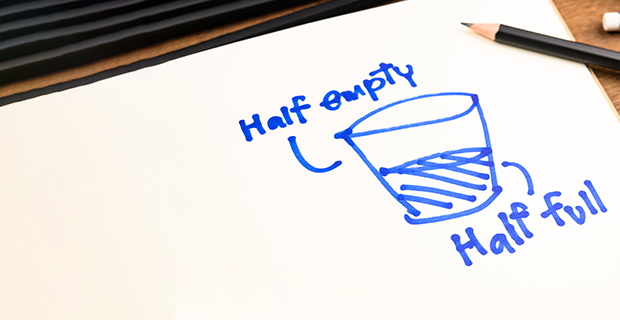Are Your Employees' Glasses Half-full or Half-empty?


November 3, 2022
The question — is your glass half full or half empty? — has been used for decades to emphasize the difference between negative and positive thinking. It's the tool that's used to describe two types of people — optimists and pessimists – so how do you use it to benefit your staff? Can you tell if someone’s glass is half full or empty?
Your employees may have a lot going on inside — insecurities within the company, overworked, money problems, relationship problems, etc. — which is why they're struggling to stay optimistic about their job. You may see it within their performance or attitudes around the workplace. With all the various reasons people can get down on themselves and become pessimists, it doesn't mean they should — or that you should let them.
Psychologist and CEO of Good Think, Inc., Shawn Achor has seen negativity in organizations and argues that you can change people's brain waves to become more positive — and ultimately more productive.
"If we can change the lens, not only can we change your happiness, we can change every single educational and business outcome at the same time," Achor said.
According to Achor, if you can raise somebody's level of positivity in the present, then their brain experiences a happiness advantage, which is your brain at positive performing significantly better than at negative, neutral or stressed.
The happiness advantage has shown that:
So, how can you create optimism within your office? You may think you lack the resources to change the levels of happiness and success within your workplace, but you have more ability to do so than you may have dreamed.
Repeat these practices for three weeks, and it will create lasting changes in your office's happiness levels.
You want to become your employees' source of increasing happiness. Then, you can throw away all of the optimist and pessimist clashing. Basically, you become their "pitcher." Then, it won't matter anymore if their glass is half-full or half-empty — you'll be there to fill them up.
The start of the year sparks big ambitions and plenty of new ideas. It's natural for teams to want to shake things up, try fresh strategies and...
MoreFor many associations, data conversations tend to orbit around monetization, technology platforms, or compliance. What often gets overlooked is the...
MoreBusiness moves fast. I’ve seen how momentum can transform organizations, and how clarity and alignment turn that momentum into lasting impact. For...
MoreComplete the form and we'll connect with you right away.
You are now in accessibility mode. To restore settings to default, click the accessibility icon on the right hand side.